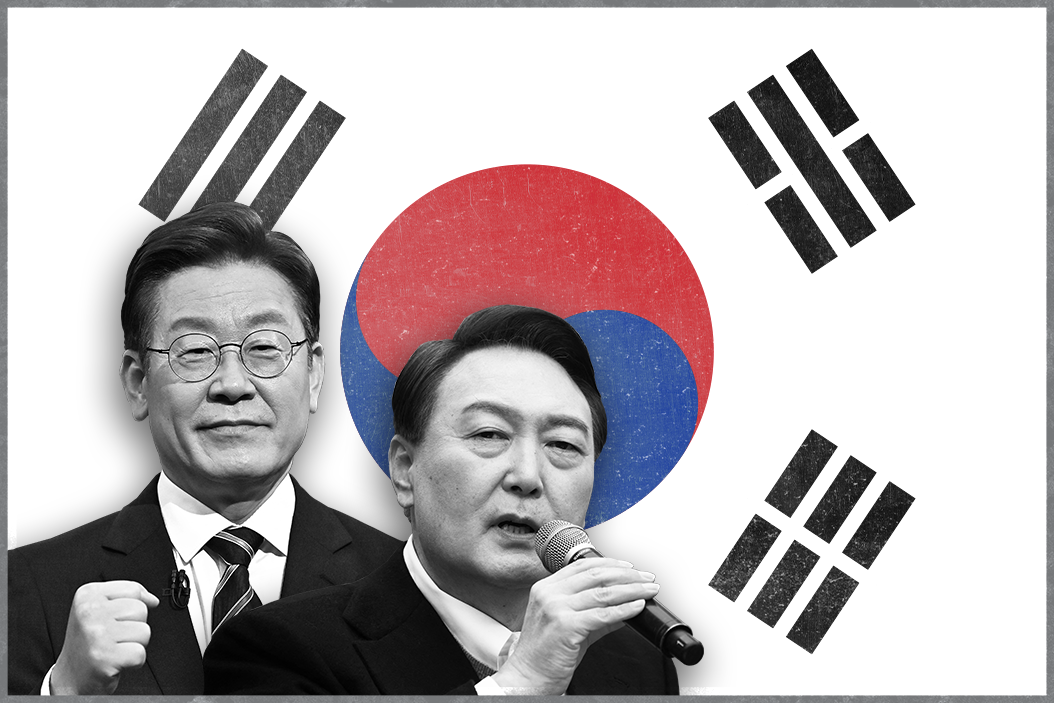March 07, 2022
South Korean pop culture has taken the world by storm in recent years. Unless you’ve been living under a rock, you’ve heard of K-pop sensation BTS, the Oscar-winning film Parasite and the dystopian Netflix series Squid Game.
But the biggest show in South Korea these days is the presidential election campaign, which has featured so many gaffes, insults and scandals that it seems made for reality TV.
On Wednesday, South Koreans head to the polls, where they face a tough choice between two unpopular candidates in what’s been dubbed the “unlikeable election.” (Meanwhile, President Moon Jae-in is likely the most popular outgoing president ever — mainly for handling the pandemic well — but he’s constitutionally limited to a single term.)
Running for the center-left ruling party is Lee Jae-myung, a former provincial governor known as South Korea’s Bernie Sanders for supporting a universal basic income. Lee has come under fire during the campaign for his alleged mob ties, a prior DUI conviction, and for offering to drop his pants to prove he hadn’t had an affair with an actress.
Lee’s conservative rival is Yoon Suk-yeol, an anti-corruption crusader whose main claim to fame is helping convict former President Park Geun-hye of abuse of power in 2018. He aims to shut down the gender equality ministry and has blamed feminism for the country’s low birth rate. Yoon has been labeled the K-Trump for praising South Korea’s former military dictators, and he’s denied allegations that he’s into shamanism and anal acupuncture.
“The South Korean political landscape is deeply polarized, and this election shows that differences will be hard to overcome,” says Koo Se-woong, editor of Korea Exposé, a newsletter focused on all things Korean. “But the ugliness of the attacks on the two main candidates also reveals serious problems with the country’s political class, which suffers from entrenched corruption and moral turpitude.”
Neither Lee nor Yoon appear presidential, he adds, and “voters recognize that.”
Indeed, presidential politics have become so unhinged and detached from real issues that many young voters have checked out. So, the battle is on to woo the undecided under-40s who might go to the polls. And although Yoon is now polling slightly ahead of Lee, the outcome is more uncertain than usual precisely because the youth vote is so hard to predict.
“Younger voters helped propel Moon to power five years ago, but it’s not clear they will stick with his party,” says Jean Lee, a senior fellow at the Wilson Center. “I’ve heard a lot of frustration among young people with the current administration’s focus on engaging North Korea at a time when they feel they need their leader to focus on their needs.”
Koo points out that young South Koreans have rather practical concerns like employment or sky-high housing prices, which have doubled in Seoul since 2017. They also tend to be fiercely anti-China, pro-US, and are not worried about Kim Jong Un.
The question, says Lee, is whether young South Koreans who’ve struggled to find good jobs and affordable housing despite strong economic growth will give the ruling party another chance or express their frustration by voting for change, or by not voting at all.
Still, the outcome will have big foreign and trade policy implications. South Korea, the world's 10th-largest economy, is a manufacturing and tech powerhouse that is crucial to America’s security structure in the Asia-Pacific. It’s surrounded by a rising China, former colonial power Japan, and, of course, highly unpredictable North Korea.
If Lee wins, he favors warmer ties with Pyongyang, some daylight between South Korea and the US, and a cautious line on China. Yoon, for his part, wants to push back more against Beijing, bolster the US alliance, and ask the Americans to deploy a second THAAD anti-missile system to deter the North Koreans.
Yoon is leading in the polls, but not by much. With little distinguishing their domestic policy proposals and so much mudslinging, voters seem all but impressed.More For You
- YouTube
China was largely absent from the core conversations at the 2026 Munich Security Conference. That, says Ian Bremmer, is telling.
Most Popular
- YouTube
At the 2026 Munich Security Conference, Brad Smith announces the launch of the Trusted Tech Alliance, a coalition of global technology leaders, including Microsoft, committing to secure cross-border tech flows, ethical governance, and stronger data protections.
When the US shift from defending the postwar rules-based order to challenging it, what kind of global system emerges? CFR President Michael Froman joins Ian Bremmer on the GZERO World Podcast to discuss the global order under Trump's second term.
TODAY at 12 pm ET: Watch our Global Stage live premiere from the Munich Security Conference
Feb 13, 2026
Tune in today at 12pm ET/6pm CET for the live premiere of our Global Stage from the 2026 Munich Security Conference, where our panel of experts takes aim at the latest global security challenges. NY Times National Security Correspondent David Sanger moderates the discussion with Benedetta Berti, Secretary General, NATO Parliamentary Assembly; Ian Bremmer, President & Co-founder, Eurasia Group & GZERO Media; Dr. Wolfgang Dierker, Global Head of Government Affairs, SAP; and Brad Smith, Vice Chair & President, Microsoft.
© 2025 GZERO Media. All Rights Reserved | A Eurasia Group media company.
